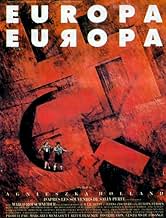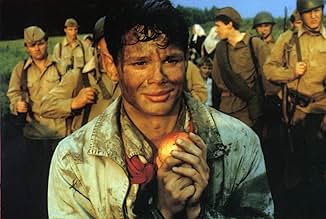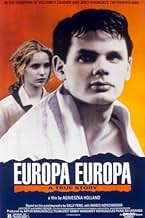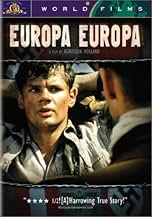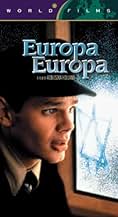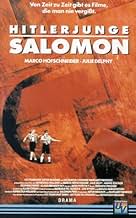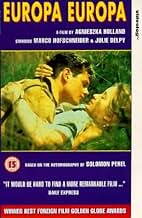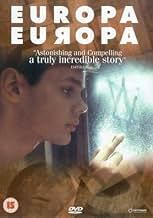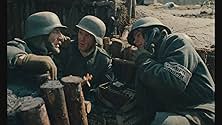NOTE IMDb
7,5/10
18 k
MA NOTE
Un garçon dans l'Allemagne nazie, essayant de cacher qu'il est juif, rejoint les Jeunesses hitlériennes.Un garçon dans l'Allemagne nazie, essayant de cacher qu'il est juif, rejoint les Jeunesses hitlériennes.Un garçon dans l'Allemagne nazie, essayant de cacher qu'il est juif, rejoint les Jeunesses hitlériennes.
- Réalisation
- Scénario
- Casting principal
- Nommé pour 1 Oscar
- 8 victoires et 8 nominations au total
Solomon Perel
- Self
- (as Salomon Perel)
Jorg Schnass
- Pfeiffer
- (as Jörg Schnass)
Avis à la une
"Europa Europa" is the sort of film that is filled with so many ridiculous coincidences that it can only be true...which it is! Time and time again, a young Jewish man's life is miraculously saved during the Holocaust and this film is his story.
This film begins in Germany just before WWII breaks out. Salomon Perel and his family are Jews and they leave Germany for safety in Poland. Unfortunately, soon the German army invades and takes Poland...and Salomon and his brother run off to avoid the pograms. Here is where the story starts to get interesting. The brothers get separated and Salomon escapes to the Soviet portion of Poland where he is taken into a communist re-education school. He learns to be the ideal communist. But, the Germans are once again on the move and invade--taking the school and its students. Thinking twice, Salomon concocts a crazy story when he's caught--telling them he's a German orphan and he was forced to go to the school. And, because he doesn't appear Jewish and can understand Russian, the Germans keep him as a sort of mascot in their army. Soon, the soldiers adore him! Later, when he tries to defect back to the Russian lines, through a funny coincidence, it appears he's captured a group of Russian soldiers--and he's an even BIGGER hero to Germany! This is only through about half of the film--the coincidences and difficult to believe situations increase tremendously! Overall, this is an excellent production and a truly unique film. There have been so many Holocaust films that it's nice to see one that is so different. It's interesting from start to finish and I strongly recommend it.
By the way, it's a minor problem but the plane Salomon sees up in the sky late in the film is a VERY modern one--made decades after WWII.
This film begins in Germany just before WWII breaks out. Salomon Perel and his family are Jews and they leave Germany for safety in Poland. Unfortunately, soon the German army invades and takes Poland...and Salomon and his brother run off to avoid the pograms. Here is where the story starts to get interesting. The brothers get separated and Salomon escapes to the Soviet portion of Poland where he is taken into a communist re-education school. He learns to be the ideal communist. But, the Germans are once again on the move and invade--taking the school and its students. Thinking twice, Salomon concocts a crazy story when he's caught--telling them he's a German orphan and he was forced to go to the school. And, because he doesn't appear Jewish and can understand Russian, the Germans keep him as a sort of mascot in their army. Soon, the soldiers adore him! Later, when he tries to defect back to the Russian lines, through a funny coincidence, it appears he's captured a group of Russian soldiers--and he's an even BIGGER hero to Germany! This is only through about half of the film--the coincidences and difficult to believe situations increase tremendously! Overall, this is an excellent production and a truly unique film. There have been so many Holocaust films that it's nice to see one that is so different. It's interesting from start to finish and I strongly recommend it.
By the way, it's a minor problem but the plane Salomon sees up in the sky late in the film is a VERY modern one--made decades after WWII.
"Europa Europa" (original title "Hitler Youth Soloman") is the story of a Jewish boy who is separated from his family and ends up assuming different identities (including, yes, a Nazi) to stay alive. What makes this film different from all the Holocaust movies I've seen is that it shows the perspective of the other side. This is NOT done in a sympathetic way but in a way that simply shows what was going on amongst the brainwashed youth and how ordinary humans were coerced into doing the most inhuman things.
Our protagonist Soloman (Marco Hofschneider) is played with a wide-eyed innocence, almost like an objective observer, as he navigates the Nazi heirarchy inadvertently making friends wherever he goes. Thus the interesting spin is that the Nazis are shown with more personality than the stone-faced butchers we've come to expect from Holocaust flicks. In fact there is very little Jewish persecution and violence shown since most of the story is set behind the ranks where Soloman is fed the same propaganda and brotherhood that the Hitler youth were fed.
The brutality is clear, and as Soloman rises through the ranks he starts to peel away the truth that, no, Jews are not simply being "relocated to Madagascar". In addition he falls for a girl (Julie Delpy) who is a rabid anti-Semite. So the film ends up posing a very interesting point that's applicable to all our lives, regardless of the WW2 context: What do we do if it turns out that our friends & adoptive family turn out to be vile monsters?
I highly recommend this movie even if you're not interested in war flicks. It's more like a coming of age story but set in the most horrifying chapter of human history.
Our protagonist Soloman (Marco Hofschneider) is played with a wide-eyed innocence, almost like an objective observer, as he navigates the Nazi heirarchy inadvertently making friends wherever he goes. Thus the interesting spin is that the Nazis are shown with more personality than the stone-faced butchers we've come to expect from Holocaust flicks. In fact there is very little Jewish persecution and violence shown since most of the story is set behind the ranks where Soloman is fed the same propaganda and brotherhood that the Hitler youth were fed.
The brutality is clear, and as Soloman rises through the ranks he starts to peel away the truth that, no, Jews are not simply being "relocated to Madagascar". In addition he falls for a girl (Julie Delpy) who is a rabid anti-Semite. So the film ends up posing a very interesting point that's applicable to all our lives, regardless of the WW2 context: What do we do if it turns out that our friends & adoptive family turn out to be vile monsters?
I highly recommend this movie even if you're not interested in war flicks. It's more like a coming of age story but set in the most horrifying chapter of human history.
The print that I saw of this film was stunning. Come to think of it, every aspect of this film was well though out, excellently executed, and just as stunning. And just like any other film that deals with the plight of the Jewish people during WWII, this is not a feel good film that will have you wanting to watch it again and again. Very well made and well acted film.
10B24
One has to be annoyed with comments that question either the historical verisimilitude or the integrity of this film, whether from the shaky ground of some rigid, illiberal ideological or religious prejudice or from some one-sided version of history. Furthermore, negative ad hominem attacks on someone other than political leaders or other persons who willingly seek out the public eye are reprehensible.
Does this story ring true? It does to me, and if there is even one-tenth as much basis in fact in the life of Salomon Perel as is represented in the film, I am satisfied. Having been to all the places and delved into the culture and history of all the nationalities that comprise its background, I am also convinced that much if not all of the story is correct at a level that goes well beyond whether this or that small factual detail is rooted in what actually happened to the real Perel.
Moreover, "Hitlerjunge Salomon" (better known in English-speaking countries as "Europa, Europa") is a masterful piece of cinema, beautifully produced and directed, and bearing a cachet of authenticity that few cross-cultural films achieve. I can attest to the utterly convincing script and characterization within the German language portion, and the bits in Polish and Russian seem equally strong.
Why is it so difficult to believe that a malleable teenager raised in a cross-cultural environment would be any less rooted in one part of his life than another? Marco Hofschneider captures precisely the right tone as he demonstrates how "Solly" and "Jupp" are two complementary aspects of the same person. Indeed, there are even good Germans and bad Germans, good Poles and bad Poles, etc., etc. throughout the film.
None of this compromises the truth that millions of other Jews did not survive the Holocaust. Nor does it demean their memory to cast a glance or two at this singular exception. The survivors have their stories as do the victims, and to explore the wider spectrum of life that goes on is surely to find hope in the ruins of an otherwise depraved episode in world history.
Does this story ring true? It does to me, and if there is even one-tenth as much basis in fact in the life of Salomon Perel as is represented in the film, I am satisfied. Having been to all the places and delved into the culture and history of all the nationalities that comprise its background, I am also convinced that much if not all of the story is correct at a level that goes well beyond whether this or that small factual detail is rooted in what actually happened to the real Perel.
Moreover, "Hitlerjunge Salomon" (better known in English-speaking countries as "Europa, Europa") is a masterful piece of cinema, beautifully produced and directed, and bearing a cachet of authenticity that few cross-cultural films achieve. I can attest to the utterly convincing script and characterization within the German language portion, and the bits in Polish and Russian seem equally strong.
Why is it so difficult to believe that a malleable teenager raised in a cross-cultural environment would be any less rooted in one part of his life than another? Marco Hofschneider captures precisely the right tone as he demonstrates how "Solly" and "Jupp" are two complementary aspects of the same person. Indeed, there are even good Germans and bad Germans, good Poles and bad Poles, etc., etc. throughout the film.
None of this compromises the truth that millions of other Jews did not survive the Holocaust. Nor does it demean their memory to cast a glance or two at this singular exception. The survivors have their stories as do the victims, and to explore the wider spectrum of life that goes on is surely to find hope in the ruins of an otherwise depraved episode in world history.
When, this summer, I saw "Saving Private Ryan", I was immediately reminded of this film. Using the same kind of camera angles that got Spielberg praise in "Ryan", we see the hollowness of the war-torn psyche and the brutality that emerges in people during warfare. We see hideous indoctrination that the German youth were subjected to, giving them depth beyond a few simple lines. Most of all, however, we see the absurdity inherent in such a large scale, world-shattering conflict. The film communicates its message with a clarity that makes one almost uneasy. As good as "Ryan" was, this is better.
Le saviez-vous
- AnecdotesThe film met with a lukewarm reception in its native Germany, with the local media being less than complimentary about it. The German Oscar selection committee did not even include it as a submission for that year's Best Foreign Language Film Oscar. Much embarrassment ensued when it went on to become one of the most successful German films ever released in the US, winning a Golden Globe and an Oscar nomination for Best Adapted Screenplay.
- GaffesAt one point Salomon narrowly misses being killed in an air-raid, which kills his roommate. Rather than show a World War II aircraft, or even a bomber, stock footage shows a single C-130 Hercules transport aircraft, which was not even designed until many years after the war.
- Citations
Isaak Perel - Salomons brother: It is written that a son never leaves his parents in difficult times.
Solomon's Father: It is also written that the son must obey his parents. And it is also your duty to watch over your brother.
- Bandes originalesThe blue Danube
Meilleurs choix
Connectez-vous pour évaluer et suivre la liste de favoris afin de recevoir des recommandations personnalisées
- How long is Europa Europa?Alimenté par Alexa
Détails
- Date de sortie
- Pays d’origine
- Langues
- Aussi connu sous le nom de
- Europa, Europa
- Lieux de tournage
- Sociétés de production
- Voir plus de crédits d'entreprise sur IMDbPro
Box-office
- Montant brut aux États-Unis et au Canada
- 5 575 738 $US
- Week-end de sortie aux États-Unis et au Canada
- 31 433 $US
- 30 juin 1991
- Montant brut mondial
- 5 575 738 $US
- Durée1 heure 52 minutes
- Couleur
- Rapport de forme
- 1.66 : 1
Contribuer à cette page
Suggérer une modification ou ajouter du contenu manquant


